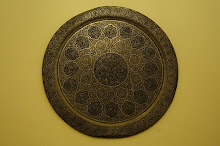Legend has it that a young man grew up in the city of Byblos, and became so handsome and prominent that he was called "Adon" (or "lord" in Canaanite) - an appellation the Greeks later hellenized into "Adonis".
Adonis was so loved by two goddesses that another god grew jealous, transformed himself into a wild boar, and gored the beloved young man to death. A river near Byblos was named Adonis after the legend (today it is called the Ibrahim River, see photo below). Its annual spring run-off is reddish which was interpreted as the very blood of Adonis coursing into the sea.
On February 15th of this year, another Lebanese river ran red into the sea - but the source was no legend or metaphor. The Lebanese Ministry of Environment found that a nearby factory had dumped a red dye into the Beirut River causing the frightening scene. That sad river was already deprived of its natural beauty by having its banks paved with concrete, and it has now suffered a second humiliation.
This event is a powerful and stark emblem of how badly things have gone wrong in Lebanon's environment. The flow of red dye may be a singular phenomenon, but Beirut's daily air pollution is three times the norms considered acceptable by the World Health Organization. The seashore cities, such as Sidon, Tyre and Tripoli, pour endless currents of raw sewage into the sea close to shore. The mountains around Beirut are paved with uncontrolled development that can only be described as a kind of urban cancer, and of civilization gone terribly wrong.
Lebanon is infamous for its civil war and troubled politics. In fact, the real threat to the country may be from environmental degradation - air, noise, water, sea, and ground pollution that is slowly but surely destroying the bodies and souls of its citizens. The red river of Beirut may be a dramatic warning, but who will heed it?
Behind these troubles is a more mysterious tale, and the legend of Adonis can enlighten us again. The boar that gored the young man is a symbol of the wild creature within us that thinks of naught but itself. It has uncontrolled appetites and is known variously as the ego, the beast within, or the "Commanding Self" - that knot of motivations created by a lifetime of greed and vanity. In the legend of Adonis, the wild self destroys the beauty that is within each human.
The factory that dumped the dye into the Beirut River, the developers who build randomly in the hills and the corrupt government officials who pocket money intended for building sewage plants suffer from the same uncontrolled appetites as the wild boar that destroys out of jealousy and self-interest. To be sure, some of this is due to the failure of the state in Lebanon, but even that is due to the rapacious motivations of its leaders and politicians.
The story of Adonis goes on to tell us that one of the goddesses who loved him begged the masters of the Underworld to let him "resurrect". And so he did, and was afterward permitted to live in the hills above Byblos (where this entry was written) in summer and spring, and to descend back to the Underworld for the other six months of the year. His drops of blood are also believed to have been transformed into the red anemone flower that carpets Lebanon's fields every spring.
For Lebanon to gain any such recovery, someone, if not many, will have to demonstrate some sincere love for their country, and for the welfare of their children, and rise beyond the narrow self-interest: the wild boar within.
Time is short. The Lebanese would do well to hear the clarion call of the red river.
Tuesday, February 21, 2012
Sunday, February 5, 2012
Subscribe to:
Comments (Atom)
















